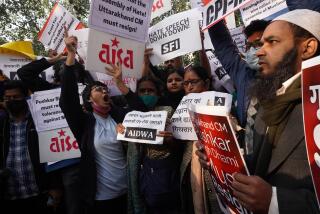No joke, these Pakistani lawyers are thugs
- Share via
LAHORE, PAKISTAN — Television reporter Shaheen Attique and his cameraman, Nasir Masood, were finishing a live shoot on the steps of a Lahore courthouse when the gang strode menacingly toward them.
Before Attique and Masood could dart away, the thugs pounced. Fists rained down from every direction. Outnumbered 25 to two, the journalists could do nothing more than tense up and take it.
“We’ll teach you a lesson!” Masood heard one of the attackers say just before someone thwacked him in the head with a club.
What distinguished the onslaught from the everyday assault and battery in this chaotic city of 10 million was what the thugs were wearing: black suits, white button-down shirts and black ties. They were lawyers, meting out the kind of street justice you’d expect to see in a barrio back alley.
And Attique and Masood’s crime? A day earlier, their channel, City-42, aired footage of a band of lawyers pummeling a Lahore police official outside the same courthouse.
In a country in desperate need of heroes, Pakistan’s lawyers have been revered as the vanguard of the grass-roots movement that helped end the military rule of Gen. Pervez Musharraf and reinstate Supreme Court Chief Justice Iftikhar Mohammed Chaudhry after his illegal removal by Musharraf in 2007.
In their trademark suits and ties, they kept returning to the streets to rally against Musharraf, undeterred by tear gas and beatings by police. During the violent protests last year, they were seen by Pakistani society as champions of democracy at a time when Musharraf had discarded the country’s constitution to safeguard his hold on power.
But even though the lawyers movement still enjoys a lofty perch in Pakistani society, the recent spate of violence against journalists and police in Lahore threatens to tarnish the lawyers’ standing.
Attique, who has been covering Lahore courts for 18 years, says the victory against Musharraf has been viewed by some lawyers, particularly young ones, as license to throw their weight around.
“After the success of the movement, these young lawyers think they’re above the law,” Attique says. “They think they can say and do whatever they want.”
Lahore police official Faqir Muhammad, who was attacked a day before Attique, says the assaults are far from isolated cases. Lawyers have a history of manhandling journalists and police, he says, but in the past the violence went unnoticed because it had never been caught on tape.
“Their behavior has always been this way,” Muhammad says. “Before, nothing was done against these lawyers. My incident got TV coverage, that’s why charges were filed.”
On July 29, 11 lawyers assaulted Muhammad, who had appeared in court that day on a case involving the alleged abduction of a girl. One of the lawyers was a relative of the girl and believed Muhammad had arrested the wrong man.
When Muhammad walked out of the courthouse, the lawyers grabbed him, ripped his uniform and tried to drag him to a courthouse room they use to drink tea and relax.
“I was alone, and there were so many of them,” Muhammad says. “They kept kicking and punching me, hitting me hard in the kidneys. I saw a crowd gathering and tried to move in that direction so that someone could rescue me.”
Eventually, bystanders intervened. The 11 lawyers were arrested and charged in the attack. A City-42 TV crew taped the incident, and by that afternoon, the footage was broadcast throughout the country.
The following day, Attique and Masood were attacked. “They came to us, shouting, ‘These are the journalists who took our pictures yesterday!’ ” says Attique, the courts reporter for City-42, a local network. “They were pulling and pushing and hitting us.”
Attique and Masood managed to break free and run to their car. But when they drove off and stopped at a red light down the road, the lawyers converged on the car, flung open the doors and began pummeling Masood. One of them snatched his video camera and smashed it on the pavement.
“They said, ‘You ran our pictures on TV, now we’re taking revenge,’ ” Masood says.
The next day, he got a threatening call on his cellphone. Inside the City-42 offices, he replays the call. A male voice tells Masood: “Know your limits. Otherwise we will come down on you harder than we already have. We can do what we want with you.” When Masood asks who the caller is, the voice responds, “You know me from yesterday.”
On Aug. 6, lawyers attacked television crews outside the Lahore High Court, pelting their vans with rocks and smashing a TV camera. Five days later, Faisalabad police official Riasat Ali was attacked after appearing at the courthouse to take a murder suspect into custody. When Ali left the building, the lawyers descended on him with punches and kicks. In the midst of the fracas, the defendant escaped.
The cases have caught the attention of several leaders of the lawyers movement, who urged Lahore bar group officials to revoke the licenses of lawyers involved in the violence.
“I cannot condemn these acts more vociferously,” says Munir Malik, a Karachi lawyer and a leading figure in the lawyers movement. “The bar associations have the responsibility of taking disciplinary action, and if they don’t, it will be fraught with consequences for the image and struggle of the legal fraternity.”
Rana Zia, president of the Lahore Bar Assn., says his group has acted to suspend the licenses of lawyers identified as being involved in violence. But he stresses that these were the actions of a few rogue lawyers.
“So one or two or three people are responsible for these kinds of incidents,” Zia says. “But I don’t think the whole [association] is involved.”
--
More to Read
Sign up for Essential California
The most important California stories and recommendations in your inbox every morning.
You may occasionally receive promotional content from the Los Angeles Times.










